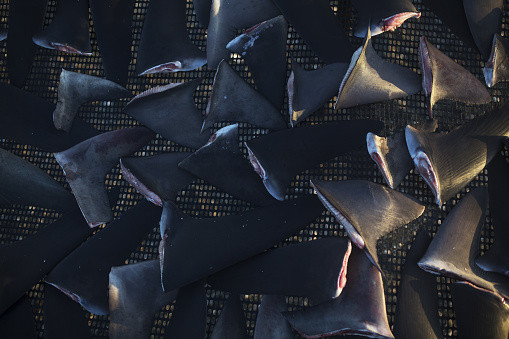
On Monday, Brazilian authorities made a significant breakthrough as they intercepted and confiscated 28.7 metric tonnes of illegally obtained shark fins, marking the largest seizure of its kind at the source.
The consignment, which was bound for export to Asian markets, was estimated by the environmental protection agency Ibama to represent the tragic loss of approximately 10,000 endangered sharks from two species: the blue shark and the shortfin mako shark.
Disturbingly, the shortfin mako shark was recently added to Brazil's national list of endangered species.
"These apprehensions on an integrated basis represent the largest recorded in the world, especially considering it is a seizure at the source where the sharks are caught," Ibama said in a statement.
Jair Schmitt, the head of environmental protection at Ibama, revealed that their operation focused on two specific companies, while investigations into other entities are still ongoing.
"This practice is already recurrent in Brazil. We had some years ago the finding of about seven or eight metric tons of shark, seized in Para state, with a similar method of finning," he said referring to a method of slicing fins off sharks and dumping the rest of the animal into the sea.
President Luiz Inacio Lula da Silva's administration has placed significant emphasis on combatting the destruction of Brazil's fauna and flora, Reuters reported.
This stands as a crucial goal, especially in the aftermath of his predecessor, Jair Bolsonaro, who had weakened environmental agencies and oversight powers.
"This action is very emblematic because it symbolizes the return of Ibama to the protection of the marine environment and especially the protection of the illegal fish trade in the country," Schmitt added.
According to Ibama, a solitary exporting company located in the southern state of Santa Catarina was accountable for 27.6 metric tons of shark fins, while the remaining consignment was confiscated at Sao Paulo International Airport from the second company.
Ibama refrained from disclosing the names of the firms or individuals involved.
In response to the seizure, Sea Shepherd Brazil, a nonprofit organization dedicated to marine conservation, urged the Brazilian government to ban the shark fin trade and import shark meat into Brazil. They emphasized the significance of such measures in safeguarding the species.
While shark fishing is prohibited in Brazil, Ibama revealed that the boats involved in the illegal shark fin trade had obtained permits to catch other fish species.
Unfortunately, during their fishing operations targeting sharks, these vessels caused the tragic deaths of numerous seabirds, including some that belonged to endangered species.
The detrimental impact on avian populations highlights the ecological consequences of such activities.
© 2025 Latin Times. All rights reserved. Do not reproduce without permission.




